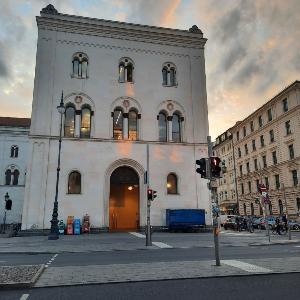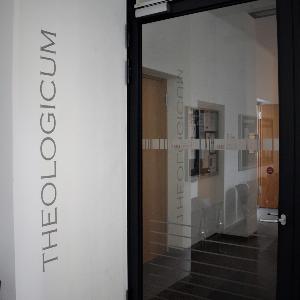The history of the faculty
In the beginning, there was a dentist. The founding of the LMU's Faculty of Protestant Theology in 1967 is largely thanks to the perseverance of Munich dentist and committed Protestant Dr. Kurt Lentrodt (1898–1979).

In the beginning, there was a dentist. The founding of the LMU's Faculty of Protestant Theology in 1967 is largely thanks to the perseverance of Munich dentist and committed Protestant Dr. Kurt Lentrodt (1898–1979).

Shortly after World War II, there were already voices calling for the establishment of a Protestant faculty in Munich, citing the growing Protestant population. However, the regional church, which had founded its own theological college in Neuendettelsau in 1947 with the Augustana, was cautious for the time being. Enthusiasm was moderate at the Erlangen faculty, founded in 1743, which saw no need for competition with its Lutheran character. And the traditional Catholic theological faculty at Munich University, which had played a significant role in the Counter-Reformation in earlier times, was also reserved at first.
However, Kurt Lentrodt, who had been a member of the church council in various Munich parishes since 1933, a member of the Confessing Church, a personal friend of Karl Barth, an elected member of the Bavarian Regional Synod since 1949, and an honorary professor at the LMU's medical faculty since 1955, persistently promoted his plan for nearly two decades. In 1963, the mood in the regional church changed. In 1964, the Catholic theology faculty at LMU voted in favor of establishing a Protestant sister faculty, the synod of the Bavarian regional church approved Lentrodt's motion to endorse the new foundation, and the LMU senate submitted a request to the Ministry of Culture to establish the faculty. In 1966, the Bavarian state parliament approved the faculty's funding, and Bavarian Minister of Culture Ludwig Huber formed a committee to appoint the first five chair holders. On June 20, 1967, Minister of Culture Huber and Bavarian Bishop Hermann Dietzfelbinger signed an agreement stipulating that the regulations of the state church law should apply to the new faculty. The faculty was officially founded on October 1, 1967. Teaching began in the summer semester of 1968.
The faculty's own programmatic profile only gradually emerged. Looking back, Lentrodt described the task of the new faculty as moving theology "out of the ghetto and into the open field of science, at a time when serious questions are being asked about the relationship between biblical accounts and historical reality." However, it was not until the early 1970s that the faculty achieved its profile as a culturally oriented and socially open center of theological teaching and research through the constellations of its founding professors. Across the boundaries of theological disciplines, there was essentially agreement that theology should be pursued as a science committed to the historical-comparative paradigm, with Christian religious life in all its facets, past and present, in its ecclesiastical forms as well as in its social and cultural sediments, as its subject matter. At the same time, this meant skepticism toward all tendencies in teaching and research to shortcut or suppress the search for argumentative considerations and justifications with religious convictions. Even though this shared fundamental conviction was already expressed differently by individuals at that time and has been interpreted in very different ways over the decades and in the differentiation of disciplines, it can still be described as the hallmark of pluralistic and plurality-open theology at the Munich Protestant Theological Faculty.

© Caroline Veit
This signature is evident not only in the interests and areas of focus of individual faculty members, but also in numerous interdisciplinary or cross-faculty thematic areas, research networks, and research centers that were and are based at the faculty. These have an impact on the education of the numerous pastors and teachers who studied and are studying at the faculty—although it must be said that the Munich faculty was and is one of the smaller theological faculties in Germany in terms of student numbers. On the other hand, the strength of its research has not only resulted in a strong presence in specialist literature, but has also led to an above-average number of academic qualifications and Munich graduates in university professions.
The Munich faculty is one of the youngest Protestant theological faculties in Germany. However, its tasks do not differ from those of the older and more traditional faculties, namely: to understand theology as a function of the church, to place it at the service of training pastors and teachers, to pursue it using scientific methods, and to align its questions with the requirements of the present day. In a special way, however, the Munich faculty sees it as its heritage and mission to understand the challenges associated with the task of theology, which are in a state of constant change, in an unbiased and self-critical manner—even if this is sometimes painful.
(Prof. Dr. Christian Albrecht)